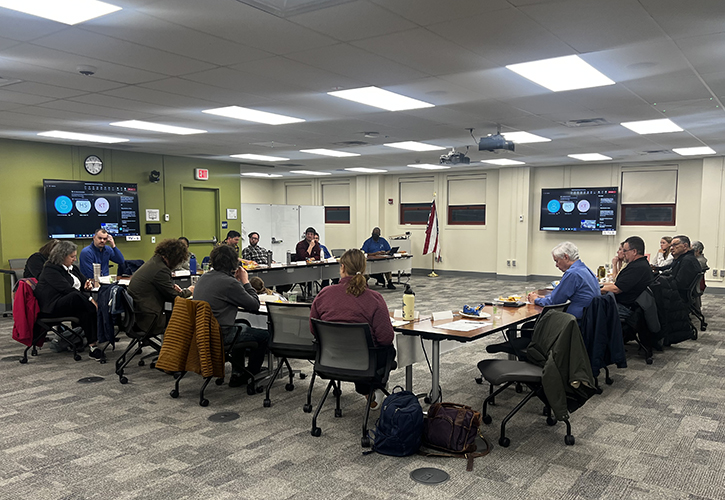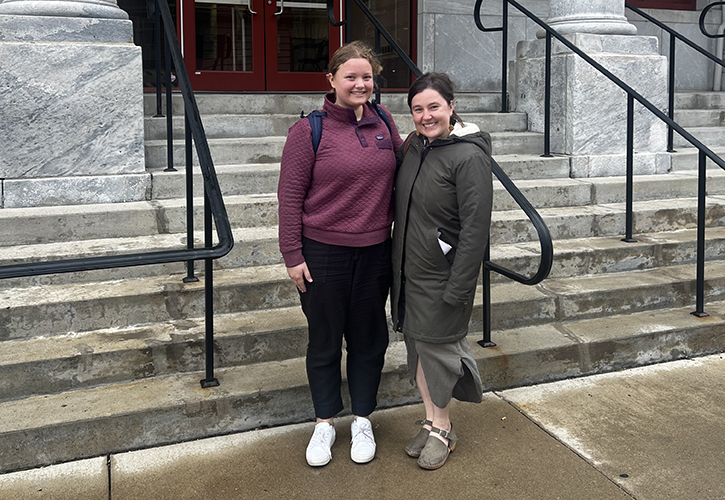Hanley Sustainability Institute

A Student Leader's perspective on City of Dayton Environmental Advisory Board meeting
By Jamie Burenga
Even before you step foot on the University of Dayton campus, I am sure you heard the word “community” to describe the school. Most students will tell you that UD is a community, and the sales pitch they give to incoming students about community is true.
Did you know, though, that the UD community extends beyond campus?
As a part of UD’s Hanley Sustainability Institute, I have begun to understand the scope of how much the school participates in local initiatives. Recently, I had the privilege to attend the City of Dayton Environmental Advisory Board (EAB) meeting, and here’s what I learned.
My name is Jamie Burenga. I am an HSI Student Leader on the Food and Growing Team. I recently started a new role as a Student Co-Director for Local Policy and Progress. In this role, the other co-director, Kiara DiLoreto, and I, work to understand and communicate the sustainability goals and work of the community outside of UD with other student leaders. Another main focus of this role is to prepare students to be engaged with sustainability work after they graduate. Based on these goals, we wanted to learn more about environmental policy and sustainability work in Dayton, so our supervisor, Sarah Richard, recommended we attend EAB meetings.

So, what is the EAB? The board is comprised of nine community members who have expertise, high levels of interest or high levels of work experience in environmental protection and sustainability. They meet once a month with City of Dayton staff from the water, sustainability and economic development offices to advise on public policy decisions. Each city department shares the work they are doing and what challenges or victories they have experienced. Representatives from Dayton and Montgomery County Public Health Department, Solid Waste District, Five Rivers Metroparks and University of Dayton also report what their respective organizations are doing for community sustainability work.
The EAB meetings are my first experience participating in local government. That being said, I was not sure what to expect from the meetings. I quickly learned all of the aforementioned city departments and community organizations are doing great work in the Dayton area. They work tirelessly to address citizen concerns, apply for grants, save residents money, put on events and activities and more to make Dayton a great place to live.
Because they are doing so much great work, most of the meeting is sharing updates and asking for support where needed. For example, the water department is putting on a Children’s Water Festival and a Water Career Fair in collaboration with Dayton Public Schools in May. They asked the board for volunteers to help with these events. The board also writes letters of support for grants and funding projects. As a student sitting in on these meetings, my favorite part of the experience is listening to the expertise and passion of the city staff and board members.
Even though there are so many amazing things happening for environmental protection and sustainable development in Dayton, many people are unaware of the great work the city and the EAB are doing. First of all, EAB meetings are open to the public and allow for citizen concerns to be shared at all meetings. The next meeting is 12-1 p.m., April 14, 2023 at City Hall. If you are looking for more ways to get involved, check out this great page from the Office of Sustainability. This is a great way to learn more about events, activities, volunteering opportunities and other tips on living more sustainably.
As a member of the UD community, I want to be involved in the Dayton community, as well. Attending EAB meetings is a great way to get involved in sustainability local policy. I am very grateful I have had the opportunity to attend these meetings, and I am excited to see what other ways myself and other students can get involved in local policy and progress.
